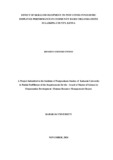EFFECT OF SKILLS DEVELOPMENT ON POST COVID-19 PANDEMIC EMPLOYEE PERFORMANCE IN COMMUNITY BASED ORGANIZATIONS IN LAIKIPIA COUNTY, KENYA
Abstract
Employee performance is a critical component of the success and effectiveness of
community-based organizations in Laikipia County, Kenya. However, there are several
challenges that hinder optimal performance in these organizations. One significant issue
affecting employee performance is the limited access to training and development
opportunities. Hence the need to conduct a study on the effect of skills development on
post covid-19 pandemic employee performance in community based non-governmental
organizations in Laikipia County, Kenya. Specifically, the study sought to assess the
effect of upskilling, cross skilling, reskilling and retooling on employee performance in
community based organizations in Laikipia County, Kenya. This study was informed by
human capital theory, cognitive theory of multimedia learning and technology
acceptance model. This study adopted an exploratory research design. The unit of
analysis was six community-based organizations in Laikipia County. The unit of
observation was 151 employees working with the six community-based organizations in
Laikipia County. The sample size was 110 respondents drawn from the six organizations
calculated using the formula developed by Taro Yamane. Data was collected using
questionnaires. A pilot study was conducted to test the data collection instruments for
their reliability while validity was tested through subjecting it to subject matter experts.
From the findings the Cronbach Alpha was between 0.706 and 0.838 implying that the
research instrument was reliable. The collected data was analyzed using descriptive
statistics including frequencies, percentages and means, and inferential statistics
including correlation and regression analysis using SPSS. The findings revealed that
there is a moderate positive and statistically significant correlation between upskilling
and employee performance in community-based organizations in Laikipia County, (r =
0.543; p < 0.05). In addition, the findings revealed that there is a moderate positive and
statistically significant correlation between cross skilling and employee performance in
community-based organizations in Laikipia County, (r = 0.643; p < 0.05). Furthermore,
the findings revealed that there is a moderate positive and statistically significant
correlation between reskilling and employee performance in community-based
organizations in Laikipia County, (r = 0.443; p < 0.05). Finally, the findings indicated
that there was a moderate positive and statistically significant correlation between
retooling and employee performance in community-based organizations in Laikipia
County, (r = 0.654; p < 0.05). The study also concluded that as a result of being provided
with an opportunity for retraining employees are more committed to the organization.
The study also concluded that as a result of being provided with an opportunity for
reskilling employees are more committed to the organization. The study also concluded
that new technologies and working processes reduced errors at work. From the findings,
the study recommended that training programs should address specific challenges faced
by these organizations. Moreover, community-based organizations should design
comprehensive training programs that expose employees to various aspects of
community-based work. Finally, the study recommended that organizations should
emphasize digital literacy and technology-driven skills to align with the evolving
landscape of community development. The findings are significant to policy makers,
practitioners and stakeholders in adjusting workforce development and capacity building
initiatives.

